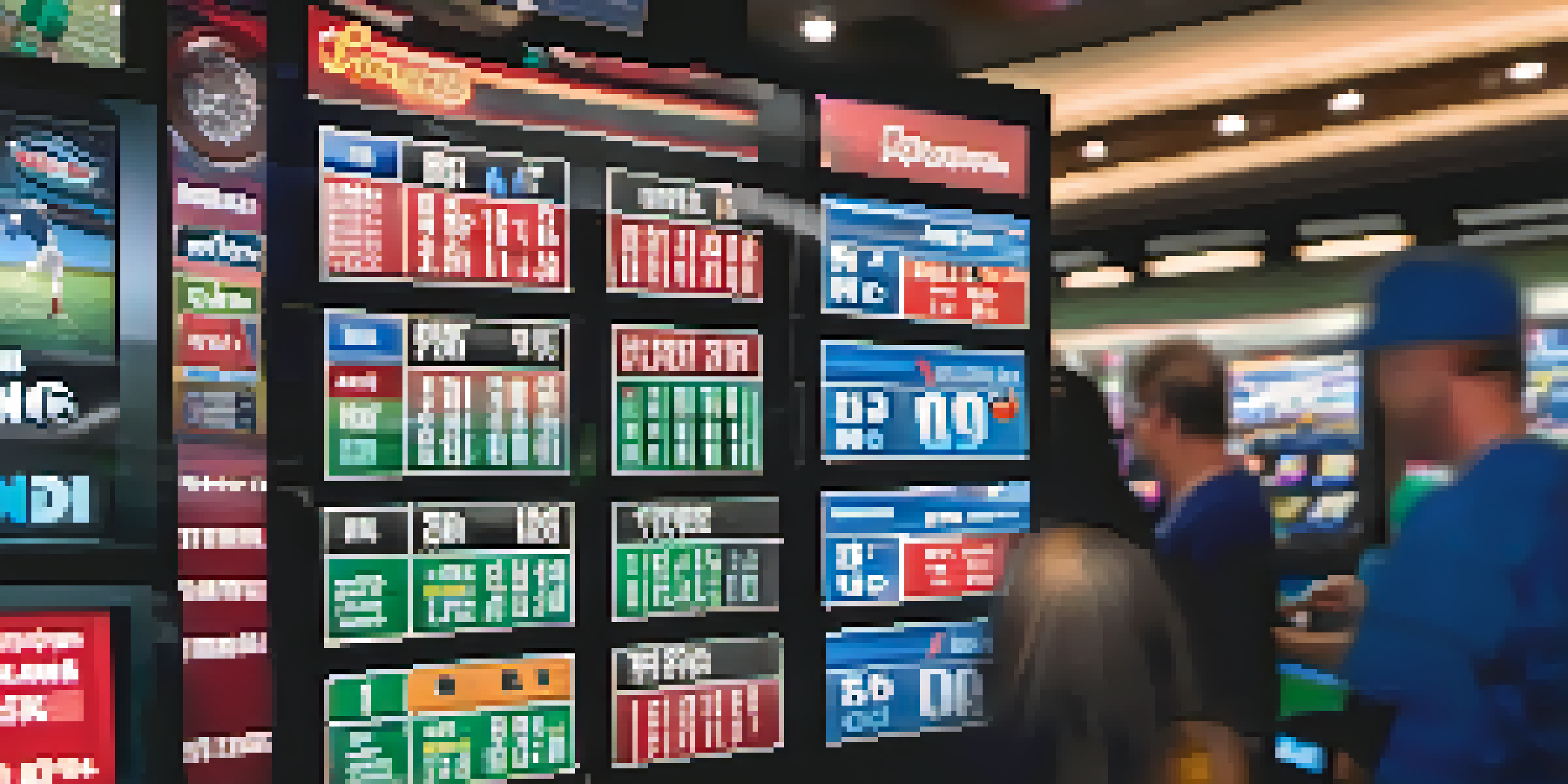Understanding the Framework of Nevada's Gaming Legislation

Overview of Nevada's Gaming Legislation Landscape
Nevada's gaming legislation is a complex yet fascinating framework that governs the state's thriving gaming industry. Originating in the 1930s, these laws set the foundation for what would become a multi-billion dollar industry. The state's commitment to regulating gaming has fostered an environment of safety and fairness for both operators and players.
The gaming industry is a complex ecosystem that requires a delicate balance between regulation and innovation.
Over the years, the legislation has evolved to accommodate new technologies and changing consumer preferences, reflecting the dynamic nature of the gaming world. For instance, the introduction of online gaming and sports betting illustrates how Nevada has adapted to keep pace with the industry. This adaptability is crucial in maintaining its position as a leading gaming destination.
Understanding this legislative framework is essential for anyone involved in or interested in the gaming sector, from operators and investors to players. With a well-defined regulatory structure, Nevada ensures a level playing field while promoting responsible gaming practices. This commitment not only protects the industry but also enhances the overall experience for all stakeholders.
Key Legislative Acts Shaping Nevada's Gaming Industry
Several key legislative acts have defined the gaming landscape in Nevada, with the Nevada Gaming Control Act being the most significant. Enacted in 1955, this act established the Nevada Gaming Control Board, which oversees licensing and regulation of gaming operators and employees. It laid the groundwork for a stringent regulatory environment that prioritizes integrity and accountability.

Another important piece of legislation is the Gaming Accountability Act, which focuses on financial transparency and responsible gaming practices. This act mandates that operators maintain certain standards to prevent fraud and promote fair play. By requiring detailed financial reporting, it aims to deter illegal activities and protect both operators and patrons.
Nevada's Gaming Laws Promote Safety
The state's regulatory framework ensures a safe and fair gaming environment for operators and players alike.
Additionally, the introduction of the Internet Gaming Law in 2013 marked a significant shift in Nevada's approach to gaming. This law allowed for regulated online poker, paving the way for a new revenue stream and attracting players from across the globe. As technology continues to advance, Nevada's legislative framework will likely evolve to embrace further innovations.
The Role of the Nevada Gaming Control Board
The Nevada Gaming Control Board (NGCB) plays a pivotal role in enforcing the state's gaming laws. This independent agency is responsible for regulating all gaming activities, from licensing operators to conducting compliance checks. By ensuring that operators adhere to established standards, the NGCB helps maintain the integrity of Nevada's gaming industry.
Responsible gaming practices are essential for protecting players and ensuring the longevity of the industry.
The board's functions extend beyond regulation; it also engages in investigative work to detect and prevent illegal activities. This proactive approach not only safeguards the industry but also builds public trust in the gaming system. Their efforts contribute to an environment where players can enjoy gaming with confidence.
Moreover, the NGCB provides valuable resources and education for both industry professionals and the public. Through workshops and outreach programs, they promote responsible gaming practices and awareness of potential risks. By fostering a culture of accountability, the board plays a crucial part in the sustainable growth of Nevada's gaming sector.
Licensing Process for Gaming Operators in Nevada
Acquiring a gaming license in Nevada is a rigorous process designed to uphold high standards within the industry. Prospective operators must undergo extensive background checks, financial scrutiny, and detailed application procedures. This thorough vetting process ensures that only qualified individuals and organizations can participate in the gaming market.
Once an application is submitted, it is reviewed by the NGCB, which evaluates the applicant's suitability based on various criteria. This includes assessing their financial stability, business experience, and overall character. The goal is to ensure that licensed operators are not only financially capable but also committed to ethical gaming practices.
Key Acts Shape Gaming Regulations
Legislation such as the Nevada Gaming Control Act and the Internet Gaming Law have defined and evolved the state's gaming landscape.
After receiving approval from the NGCB, operators must comply with ongoing regulations and reporting requirements. This includes regular audits and updates to maintain transparency and accountability. By prioritizing a comprehensive licensing process, Nevada fosters a trustworthy environment for both operators and players.
Taxation and Revenue Generation from Gaming
Taxation is a critical aspect of Nevada's gaming legislation, significantly contributing to the state's revenue. Gaming taxes are levied on operators based on their gross gaming revenue, with rates varying depending on the type of gaming offered. This structure ensures that the state benefits financially from the thriving gaming industry.
The revenue generated from gaming taxes funds various public services and initiatives, including education and infrastructure projects. This symbiotic relationship between the gaming sector and state funding highlights the importance of a well-regulated industry. As gaming continues to expand, the potential for increased revenue remains a key factor in Nevada's economic stability.
Additionally, the state encourages responsible gaming practices through its tax structure. By promoting programs aimed at preventing gambling addiction, Nevada demonstrates its commitment to the wellbeing of its residents and visitors. This balance between revenue generation and responsible gaming is essential for the long-term sustainability of the industry.
Emerging Trends in Nevada's Gaming Legislation
As the gaming landscape evolves, so too does Nevada's legislation, reflecting emerging trends and technologies. One notable trend is the rise of sports betting, which gained traction following the Supreme Court's decision to legalize it nationwide. Nevada has positioned itself as a pioneer in this space, continually updating its regulations to accommodate this growing segment.
Another significant trend is the integration of technology in gaming operations, especially with the rise of mobile gaming applications. The state has recognized the need for clear regulations regarding online gaming to ensure player safety and fair play. This adaptability is crucial in maintaining Nevada's status as a leader in the gaming industry.
Future Trends in Gaming Legislation
Emerging trends like sports betting and mobile gaming are prompting Nevada to adapt its regulations to ensure player safety and industry integrity.
Moreover, there is a growing emphasis on responsible gaming legislation. As awareness of gambling addiction increases, Nevada is taking proactive steps to address these issues through education and prevention programs. By staying ahead of emerging trends, Nevada's gaming legislation aims to foster a safe and enjoyable environment for all participants.
Conclusion: The Future of Gaming Legislation in Nevada
The future of gaming legislation in Nevada looks promising, with ongoing adaptations to meet the needs of a rapidly changing industry. As new technologies and gaming formats emerge, the state will continue to refine its regulatory framework. This proactive approach ensures that Nevada remains at the forefront of the gaming world.
With a strong emphasis on transparency, accountability, and responsible gaming, Nevada's legislative framework sets a benchmark for other states to follow. The collaborative efforts between regulators, operators, and stakeholders contribute to a vibrant gaming ecosystem that prioritizes the safety and enjoyment of players.

Ultimately, as Nevada navigates the complexities of the gaming industry, its commitment to robust legislation will be key to sustaining its legacy as a premier gaming destination. By fostering innovation while safeguarding players, Nevada is poised to thrive in the evolving landscape of gaming for years to come.